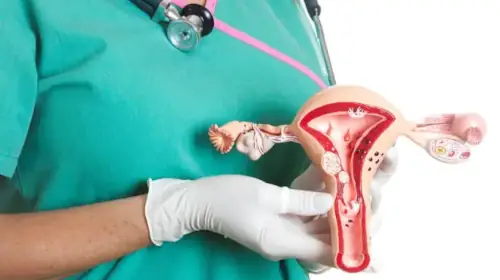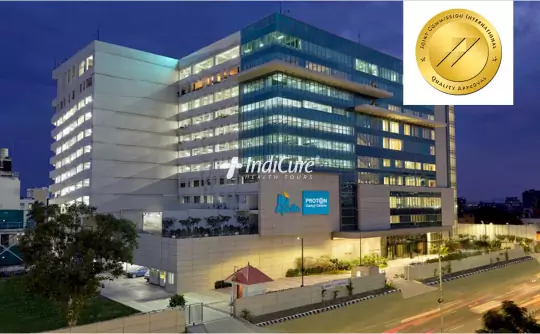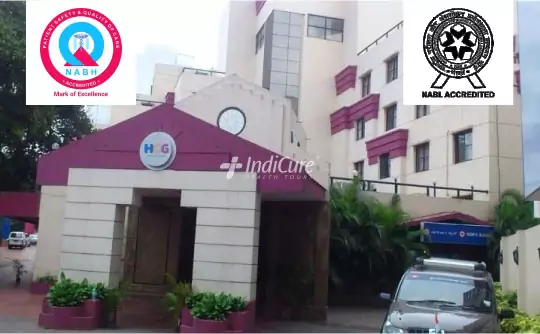

Uterus Cancer Treatment Cost in India depends on the type of treatment required, your medical condition, hospital, and the city where you choose to get the treatment done. You may need either surgery or chemotherapy, or may need both; or a combination of chemotherapy, radiotherapy, hormone therapy, and surgery. The uterus cancer treatment cost in India would thus change accordingly.
The cost quoted below in the cost table is indicative and should not be taken as the final cost of the uterus cancer treatment cost in India. The final cost can be ascertained after the oncologist has evaluated the patient. The cost in Indian Rupees can vary based on the exchange rate.
Explore the typical uterus cancer treatment cost in India with IndiCure Health Tours:
| Procedure | Cost (Range in US $) |
|---|---|
| Investigations | 500-1,000 |
| Chemotherapy | 300-2,000 per cycle |
| Radiotherapy | 3,500-5,500 |
Often, the most effective approach to treating uterine cancer involves a combination of treatments. Surgery, whether performed alone or alongside other therapies, is commonly employed. The costs associated with each treatment may vary. IndiCure advises consulting with our expert oncologists in India to explore and understand all available options.
The overall uterus cancer treatment cost in India depends on the number of chemotherapy or radiation therapy cycles that a patient has to undergo. In some patients, the oncologists might advise giving more than a couple of cycles of chemotherapy or radiation therapy to kill the cancerous cells.
A significant expense when considering uterus cancer treatment in India is the oncologist's fee. IndiCure connects you with board-certified and highly skilled oncologists who have a proven track record of successful surgeries. Although the fee may vary depending on the oncologist's experience, you can rely on IndiCure Health Tours to recommend professionals who prioritize your safety and ensure excellent outcomes for your uterus cancer treatment in India.
Selecting an accredited medical facility with experienced and qualified staff is essential for effective uterus cancer treatment in India. Major cities in India generally provide advanced medical facilities and more seasoned oncologists, which may lead to higher costs. IndiCure Health Tours opts for recommending cancer treatment centers in these larger cities to ensure high-quality care and safety of the overseas patients.
Pre-surgical and treatment costs vary depending on the cancer stage and the patient's overall health, influencing the number and type of tests and treatments needed. Post-treatment expenses may involve prescription medications and follow-up consultations.
At IndiCure, we consolidate most of the expenses for your uterus cancer treatment in India to provide you with an inclusive and cost-effective package tailored to your budget and individual requirements. After receiving medical reports, your case manager will provide an estimated cost based on a discussion with the oncologist.
The final uterus cancer treatment cost in India can however be confirmed after your face-to-face consultation with the oncologist.
Here is a set of questions you should consider asking before commencing your medical tour for uterus cancer treatment in India.
Prepare to answer questions about your:
The most frequent type of cancer in the female reproductive system is uterine cancer. Uterine cancer develops when healthy cells in the uterus begin to alter and grow uncontrollably, resulting in a tumor.
Tumors can be malignant or non-cancerous. A malignant tumor has the potential to grow and spread to other areas of the body. A benign tumor can expand, but it will not spread to other parts of the body.
Uterine cancer is divided into two types:
The majority of uterine malignancies are of this type. It arises from the endometrium's cells. Endometrial cancer is the common name for this type of cancer.
Endometrioid carcinoma is a frequent subtype of endometrial cancer. Treatment for this type of cancer differs based on the tumor's grade, how far it has spread into the uterus, and the disease's stage or extent.
This type of uterine cancer originates in the uterine glands' supporting tissues or in the uterine muscle, the myometrium. Sarcoma contributes to approximately 2% to 4% of all uterine malignancies.
The symptoms of uterine cancer might be mistaken for those of a variety of other illnesses. This is especially true for diseases that affect the reproductive organs.
Doctors don't know what causes endometrial cancer. What is known is that something causes changes (mutations) in the DNA of cells in the endometrium, or uterine lining.
Normal, healthy cells become abnormal as a result of the mutation. Healthy cells proliferate and replicate at a predetermined rate before dying at a predetermined period. Abnormal cells multiply and develop out of control, and they don't perish. The aberrant cells that are collecting form a bulk (tumor). Cancer cells infiltrate adjacent tissues and can break out from a primary tumor to spread to other parts of the body (metastasize).
Factors that increase the risk of uterine/ endometrial cancer include:
If you are suffering from any of the above-mentioned symptoms, you should see a doctor immediately who would advise tests to confirm the diagnosis. If you are diagnosed with endometrial cancer, you need to start the treatment immediately.
Treatment for uterus cancer is determined by several criteria, including the cancer's stage, any other health issues you may have, and your personal preferences. Surgery, radiation, chemotherapy, immunotherapy or a combination of various treatments can all be used to treat endometrial cancer.
Surgery: Endometrial cancer is usually treated by a hysterectomy, which entails removing the uterus as well as the fallopian tubes and ovaries (salpingo-oophorectomy). A hysterectomy prevents you from becoming pregnant in the future. You'll also go through menopause if your ovaries are removed, if you haven't already.
Your surgeon will also look for symptoms of cancer spreading surrounding your uterus during the operation. Lymph nodes may also be removed for testing by your surgeon. This aids in determining the stage of your cancer.
Radiation therapy: To kill cancer cells, radiation therapy employs high-energy beams such as X-rays and protons. Your doctor may offer radiation to lower your chances of a cancer return following surgery in specific cases.
Radiation therapy may be recommended before surgery in some cases to reduce a tumor and make it easier to remove. If you aren't in good enough health to have surgery, radiation therapy may be your only option.
Chemotherapy: Chemotherapy is a type of cancer treatment that involves the use of chemicals to kill cancer cells. You may receive a single chemotherapy treatment or a combination of two or more drugs.
Chemotherapy medications can be either orally or injected into your veins (intravenously). These medications enter your bloodstream and kill cancer cells as they move through your body.
Chemotherapy may be prescribed following surgery if there is a chance that the cancer will return. Chemotherapy can also be used prior to surgery to shrink the size of the tumor, making it more likely to be entirely eliminated during surgery.
Hormone therapy: Hormone therapy entails taking drugs to reduce the body's hormone levels. Cancer cells that rely on hormones to develop could perish as a result. If you have advanced endometrial cancer that has gone beyond the uterus, hormone therapy may be an option.
Targeted drug therapy: Targeted medication treatments concentrate on specific defects found in cancer cells. Targeted medication treatments can kill cancer cells by preventing them from exploiting these defects. For advanced endometrial cancer, targeted medication therapy is frequently paired with chemotherapy.
Immunotherapy: Immunotherapy is a medicine that boosts your immune system's ability to fight cancer. Because cancer cells create proteins that blind immune system cells, your body's disease-fighting immune system may not target cancer. Immunotherapy works by interfering with the immune system's natural processes. If endometrial cancer has progressed and other treatments have failed, immunotherapy may be tried.
The results of the treatment depend on the stage of the uterus cancer. If detected early, there is a good chance of complete recovery.
Uterus removal surgery for endometrial cancer is a major surgery. An abdominal hysterectomy usually requires 3 to 7 days in the hospital. After an abdominal radical hysterectomy, the average hospital stay is 5 to 7 days.
It can take anywhere from 4 to 6 weeks to fully recover.

Chennai
The Apollo Proton Cancer Centre (APCC) is South Asia's and the Middle East's first and only proton therapy centre, as well as India's first JCI-accredited cancer hospital. The APCC includes a completely integrated treatment suite that provides the most advanced surgical, radiation, and medical procedures available. The Centre brings together a remarkable team of clinicians renowned globally in cancer care, in keeping with the Apollo Pillars of Expertise and Excellence.

Bangalore
HCG- HealthCare Global Enterprises Ltd, is the specialized chain of hospitals in cancer care headquartered in Bangalore. Founded by Dr. Ajaikumar, a renowned medical and radiation oncologist with 40 years of experience, HCG has 26 centres across India with its largest facility in Bangalore. HCG Hospital Bangalore is not only the most advanced facility for cancer care in India, it is a Centre of Excellence for the most advanced cancer care and research.
Endometrial cancer, uterine sarcoma, and other rare forms of cancer that can develop in the uterus are all examples of uterine cancer. However, the phrases "endometrial cancer" and "uterine cancer" are frequently interchanged. This is due to the fact that endometrial malignancies are far more common than other cancers that might develop in the uterus.
Endometrial carcinoma is the most prevalent disease affecting the female's reproductive system in the United States. Approximately 3% of women are diagnosed with uterine cancer at some time in their lives.
You can do the following to lower your risk of endometrial cancer:
People who are designated female at birth (DFAB), including cisgender women and nonbinary people with vaginas, have a uterus as part of their reproductive system. It's the place where a baby develops and matures during pregnancy.
The body, also known as the corpus, is the top part of your uterus. Your cervix connects your uterus to your vagina at the end of your uterus. Uterine cancer is cancer that develops in the uterus's body. Cervical cancer, or cancer of the cervix, is a separate type of cancer.
The endometrium is the uterus' inner layer. During your menstrual cycle, it changes.
In the case of pregnancy, estrogen causes the endometrium to thicken. Your body generates less estrogen and more progesterone, a separate hormone, if you don't get pregnant. The uterine lining sheds when this happens. Periods occur during this time.
Your doctor may advise one or many of these tests to confirm uterus cancer treatment:
Lab Tests: CA-125 assay is a blood test that measures the protein CA-125. CA-125 levels above a certain threshold can indicate the presence of cancer in your body.
Imaging Tests: CT, MRI, and Transvaginal ultrasound are the imaging tests advised to get clear pictures of the uterus in your body.
Other Tests: May include endometrial biopsy, hysteroscopy, and D&C
No. The Pap test (Pap smear) isn't used to diagnose or screen for uterine cancer. It examines the cervix for cancer.
The most common treatment for endometrial cancer is surgery. Your uterus and cervix will almost certainly be removed, in a surgery that is called hysterectomy. There are three different types of hysterectomy operations:
Total Abdominal Hysterectomy: Your uterus is accessed and removed through an incision (cut) in your abdomen.
Vaginal Hysterectomy: is when your uterus is removed through your vaginal canal.
Radical Hysterectomy: If cancer has spread to your cervix, you may need to have a radical hysterectomy. Your uterus and the tissues around it are removed by the surgeon. The top region of your vagina, adjacent to your cervix, is also removed by the surgeon.
During a hysterectomy, surgeons frequently do two additional procedures:
The ovaries and fallopian tubes are removed in a bilateral salpingo-oophorectomy (BSO). The majority of patients require this extra step to ensure that all cancer is removed.
Lymph node dissection is a procedure for removing lymph nodes and determining whether cancer has spread.
Many women with uterine cancer must have their ovaries removed. However, removing the ovaries will cause you to enter menopause if you haven't already. If you're under 45 and premenopausal, speak with your doctor about whether or not you should keep your ovaries.
The following are some of the side effects of uterine cancer surgery:
Infertility- you won't be able to conceive after the surgery
Menopause- it has its associated symptoms, such as vaginal dryness and nocturnal sweats
Consult your healthcare physician if you're considering ERT. You and your partner can talk about your cancer risk and make the best decision for you.
No, there is no screening tool for uterine cancer. Regular testing isn't normally recommended for persons who don't have any symptoms. However, if you're at a higher risk, they may do so. If you're at high risk, talk to your doctor about getting frequent uterine cancer screenings.
Endometrial cancer has an 81 percent five-year survival rate. This means that 81 percent of patients who are diagnosed with the condition survive five years. When the cancer is limited and hasn't spread outside the uterus, the incidence is significantly greater. The survival rate thereafter rises to as high as 95%. Treatments and survival rates continue to improve.
When uterine cancer is untreated and spreads, it is fatal. Cancer that hasn't gone outside the uterus has a 95 percent survival rate. When cancer spreads to other parts of your body other than your uterus, your chances of survival drop to 17%. A good prognosis is dependent on early detection and treatment.
Endometrial cancer is frequently discovered at an early stage, which is fortunate. Because many people observe odd bleeding and report it to their doctors, this is the case. If cancer is detected early and hasn't spread to other organs, your uterus can be removed and the malignancy cured.
Any unexpected bleeding or spotting should be discussed with a healthcare physician. If you have a family history of endometrial cancer, talk to your doctor about getting tested every year. Beginning at the age of 35, you may require an endometrial biopsy once a year.
Any unusual bleeding should be reported to your doctor. If you still menstruate, abnormal bleeding includes bleeding between periods, and if you're postmenopausal, bleeding or spotting. Abnormal bleeding can be a sign of a variety of illnesses, including uterine cancer.
The most prevalent type of cancer, type 1, does not spread quickly. Cancers of type 2 spread swiftly and may necessitate more harsh therapy.
In addition to the cost of uterus cancer treatment in India, there are several other expenses you should plan for when organizing your medical trip to India. These include:
By accounting for these additional expenses along with the uterus cancer treatment cost in India, you can create a comprehensive budget and ensure a smooth, comfortable recovery experience.
Make your medical trip to India even more comfortable and complete with our range of additional services, designed to take care of all your needs beyond the hospital.
Traveling abroad for medical reasons can be challenging if you are alone, but with IndiCure by your side, it doesn't have to be. With over fifteen years of experience and an exclusively curated network of India's best surgeons and top hospitals, we make your medical tour to India easier and safer. We will guide you at every step, handling all the end-to-end arrangements for your surgery, travel, and stay.
Ramandeep Dhaliwal
a month ago
I had great experience having rhinoplasty through Indicure. Dr. Ruchika from Indicure has helped me in finding best plastic surgeon, answering all my questions...
Ramandeep Dhaliwal's Full Review
Joshua Archer
3 months ago
My name is Joshua Archer I'm from New Zealand, bay of plenty, kawerau I opted for the bypass surgery in January 2023 but planned it in advance for 28 September found IndiCure...
Joshua Archer's Full Review
Kera Ren
8 months ago
Absolutely loved my experience with IndiCure - from first inquiring to meeting the surgeon pre op to my follow up post op. The surgeon was extremely approachable...
Kera Ren's Full Review
Andreana Paul
5 months ago
Had a wonderful experience. Visited India for my plastic surgery. From sending mails, airport pickup, comfortable accommodation and, to smooth hospital appointment booking...
Andreana Paul's Full Review
Brandi Luce
5 months ago
I had the privilege of using Indicure's services for a cosmetic procedure that I had wanted for a long time but had always been apprehensive about. Ruchika helped me...
Brandi Luce's Full Review
Jade M
3 years ago
Indicure Health Tours went above and beyond my expectations. They helped me with every aspect of my journey and were professional, kind and caring. I was...
Jade M's Full Review
The content on the website (www.indicure.com) is intended to be general information and is provided only as a service. All photographs on our website of before and after results are examples only, and do not constitute an implied or any other kind of certainty for the result of surgery.
Learn about IndiCure Health Tours' comprehensive editorial policy that strives to deliver trustworthy, helpful, relevant, accurate and people-first content on medical tourism in India.
It is not medical advice and should not be taken as medical advice. It should not be used to diagnose or treat a health condition and is in no way meant to be a substitute for professional medical care. You are advised to see a surgeon in person to assess what surgery may or may not accomplish for you.
It is also important to keep your expectations realistic and to understand that all surgical procedures carry risks and should never be taken lightly.